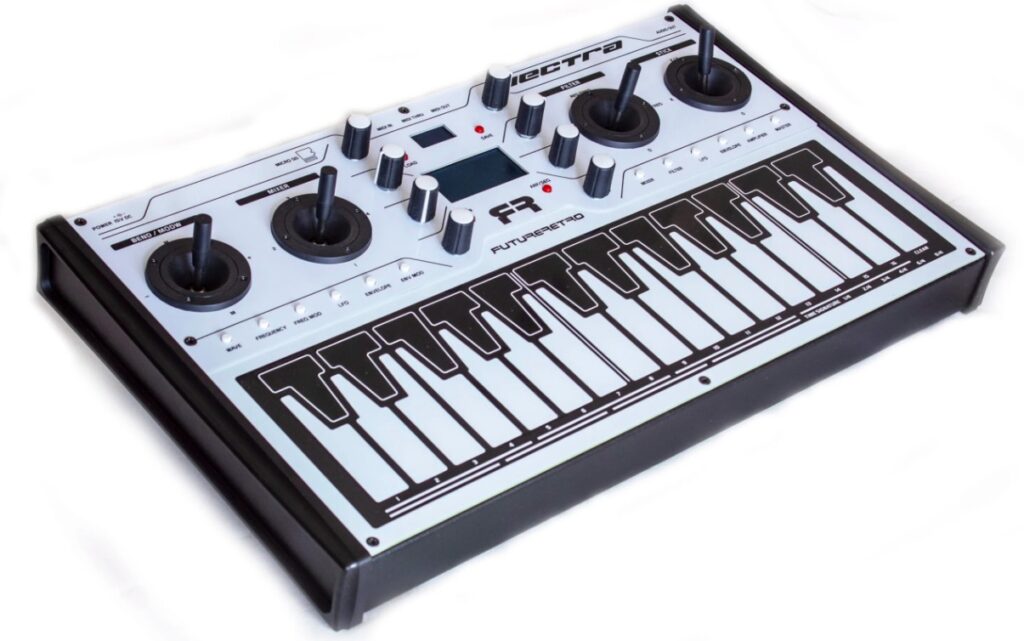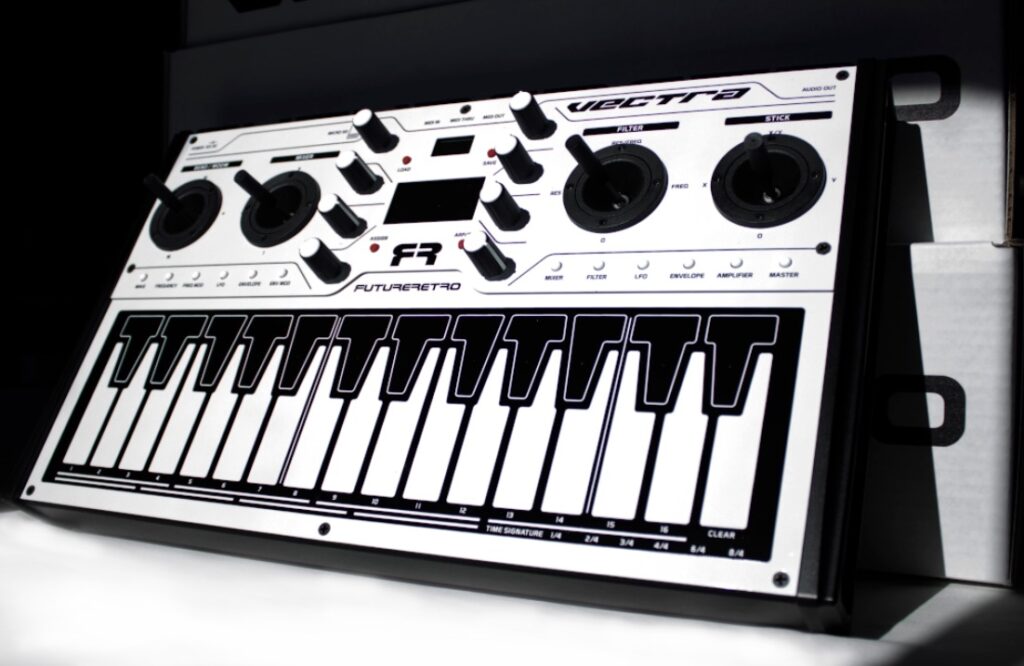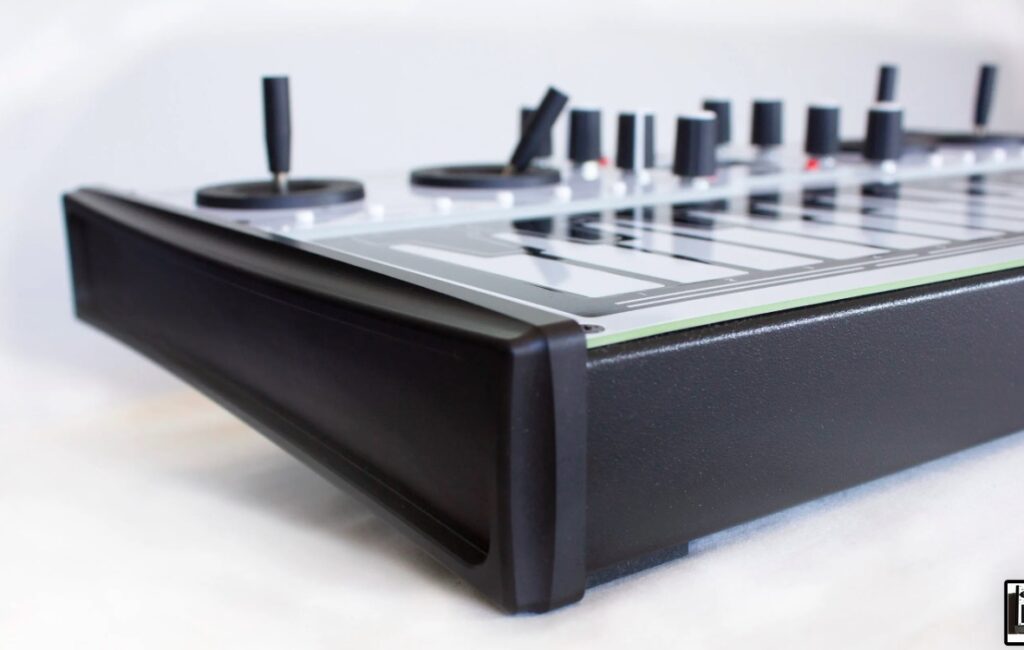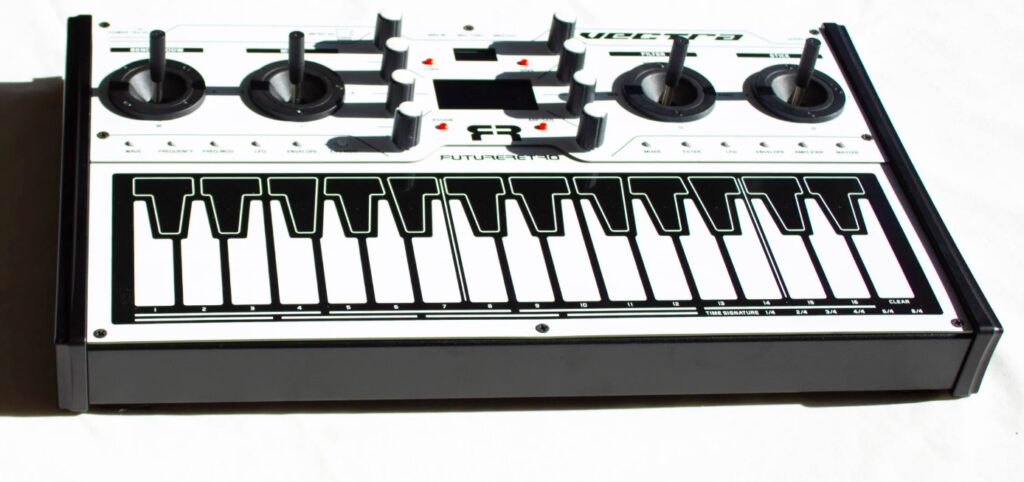Bringing old-school tech into the modern day, Future Retro’s take on vector synthesis is a hugely endearing weirdo. Greg Scarth finds out more.

You only need a few seconds with the Future Retro Vectra to conclude that it’s an oddball. Here’s a synth with a 29-key capacitive touch keyboard, for a start; that’s an approach which very few instruments take, but one which proves effective for the wilfully weird Arturia MicroFreak. We’ve got a hybrid synth engine, minimal physical controls and a menu-based editing system which feels distinctly old-school. But with that said, the Vectra packs some seriously innovative synth power. Future retro, indeed.
The name of the Vectra hints at the unusual approach here. Vector synthesis is a concept generally associated with 1980s and 90s synths like the Sequential Circuits Prophet VS and Korg Wavestation. The idea is that different signals are mixed and blended using ‘vector’ joystick – either manually or via some kind of automation – meaning that timbres can evolve, overlap and shift against each other in unique ways. The implementation in the Vectra is particularly complex, drawing on what Future Retro describe as “a powerful self-contained semi-modular synthesiser” approach, with four oscillators, two noise sources, four ring modulators (all digital) feeding into a multi-mode analogue filter and main analogue VCA. Modulation comes via five LFOs, six morphing envelopes and an extensive internal modulation routing system. Sonically, the results are stunning, from the deepest of subby bass through to glossy paraphonic pads.

To cut to the chase, the Vectra is a synth you’ll either love or hate. There are red flags here for a certain type of musician, and you probably already know if an unconventional keyboard and menu-based editing will be an issue for you. Programming the Vectra revolves around the screen and encoders, an approach which feels a bit old-fashioned by modern standards but reflects the complexity and versatility of the synth architecture. Future Retro claim there are around 500 internal signal routings and 256 sound parameters, which gives the synth incredible depth. That’s its strength and weakness all wrapped up in one, because the bottom line with the Vectra is that you’ll need to dig deep to get the most out of it. This is not a cheap synth by anyone’s standards, but the £1,500+ price tag is justified if you’re willing to work for it.

The Vectra was originally released back in 2021 but only around 100 units were produced before the company went out of business, with founder Jered Flickinger blaming the long-term impact of the Covid pandemic and related supply chain issues: “Due to the current state of the world and global parts shortages, we are forced to close our doors.” It’s a common story in music tech, and one which is all too easily overlooked as so many of us look for the new brands, latest products and fresh releases. Future Retro’s original incarnation brought us oddball icons including the 777, the Retro XS and the Revolution; the new company is reportedly under different ownership but appears to retain the input of Flickinger. We need boutique brands like this to keep the industry alive, alongside more accessible and affordable options. The reference point of the Arturia MicroFreak feels incredibly apposite here: vector synthesis aside, the two instruments share a lot of similarities, but the affordability of the MicroFreak shouldn’t detract from the fact that the Vectra is also a brilliant synth. One is more accessible, sure, but the success of the big boys is impossible without the work of smaller brands like Future Retro.

There are elements of the Vectra which might be a turn-off to some. If you’re looking for a conventional synth with lots of physical controls or even a standard keyboard, this probably isn’t for you. Who does the Vectra appeal to? Quite frankly, the hardcore synth nerds. This is one which needs work, and that’s fine. If you want something immediate, there are lots of other options out there for you, but the Vectra will reward the efforts of those who are willing to put in the time. Here’s to many more years of winding back the clock and looking to the future.
Greg Scarth
More info/buy